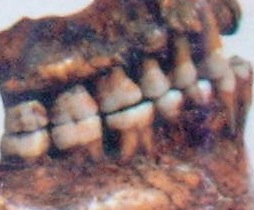Science News
Neanderthal Diet
December 28, 2010

“Eat food. Not too much. Mostly plants.” Michael Pollen offered this nutrition mantra only a few years ago, but it turns out that Neanderthals practiced his dietary guidelines tens of thousands of years ago.
In a new study, published yesterday in the Proceedings of the National Academy of Sciences, researchers found that Neanderthals ate more than just meat. In addition, our ancient cousins cooked some of their foods, “suggesting an overall sophistication in Neanderthal dietary regimes,” according to the report.
Turns out that tooth tartar can tell a lot about a human species. By examining the calculus (that's hardened plaque, not advanced mathematics) in dental remains of fossils from Belgian and Iraqi caves, the researchers recovered grains and phytoliths—evidence of plant-eating. (Neanderthals could’ve used some floss, eh?) Their diet was varied, according to the study :
Some of the plants are typical of recent modern human diets, including date palms (Phoenix spp.), legumes, and grass seeds (Triticeae), whereas others are known to be edible but are not heavily used today.
It appears Neanderthals cooked a good percentage of their grains and vegetables, but getting an accurate picture is difficult. From Scientific American:
To better assess starch grains from the samples, the researchers tried cooking similar plant products and found that heating the starches for more than half an hour rendered them largely unidentifiable, and thus they would not have been categorizable in fossil form.
Pallab Ghosh wrote in the BBC News that previous “chemical analysis of their bones suggested they ate little or no vegetables,” and anthropologists often speculated that Neanderthals disappeared 30,000 years ago due to their limited meat diet. This new evidence can now put that theory to rest, according to the authors.
Image from We El/Wikipedia